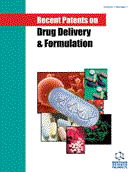Abstract
Rapid advances in drug discovery and development have spawned numerous innovative drug delivery approaches [1]. Although these efforts have primarily focused on optimizing the performance of drugs targeted for the current market, enhanced delivery of drugs may also result in the revitalization of marginally effective or failed formulations due to their original poor solubility. Plasma lipoproteins have long been considered as appropriate models for drug delivery vehicles, particularly because of their potential for transporting chemicals with low water solubility [2]. Additional features that render lipoproteins particularly suitable for drug delivery are their natural, bio-compatible components, their small size, the ability to deliver the drug itself rather than a prodrug or conjugate and their receptor mediated their uptake [3] or the uptake of their payload [4,5], particularly by cancer cells [6,7]. There has been increased activity in the patenting of lipoprotein type formulations in the last several years, primarily with the aim of developing enhanced drug delivery vehicles. This communication attempts to review the patenting activity in this area with particular focus on drug delivery and cancer chemotherapy.
Keywords: Lipoproteins, apolipoproteins, drug solubility, side effects, drug resistance
 2
2














